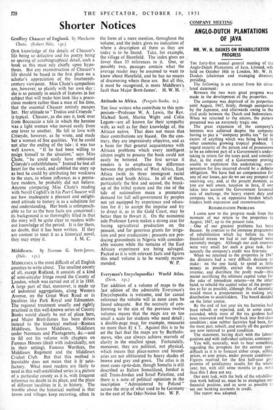THE four writers who contribute to this sym- posium—Professor W.
A. Lewis, the Rev. Michael Scott, Martin Wight and Colin Legum—are all known for their sympathy with, as well as for their knowledge of, the African native. That does not mean that their contributions are biased. On the con- trary, they are impreisively objective, and as a basis for that general acquaintance with African problems which every intelligent citizen ought to possess the book could not easily be bettered. = The first service it renders is to emphasise the difference between the problems of West Africa, East Africa (with its three immigrant racial strains) and South Africa. In all of them, particularly the first and second, the break- up of the tribal system and the rise of the tide of nationalism mean a premature demand for full self-government by peoples not yet equipped by experience and educa- tion for it ; to accept the impulse and try to direct it, as in the Gold Coast, may be better than to thwart it. On the economic side Professor Lewis makes a strong case for basing agricultural production on the peasant, and for generous grants for irriga- tion and pest eradication ; peasants are pro- ducing groundnuts in Nigeria with consider- able success while the remains of the East African experiment are being salvaged. Packed as it is with relevant facts and figures this small volume is to be warmly recom-


































 Previous page
Previous page